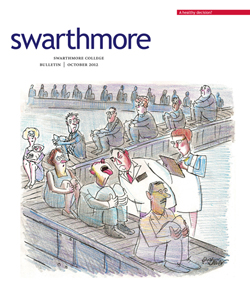Same as It Ever Was

“The election will be close—it could be a replay of 2000,” says Rick Valelly ’75, Claude C. Smith ’14 Professor of Political Science. Photo by Laurence Kesterson
When Democratic strategist James Carville uttered his immortal line, “It’s the economy, stupid,” in the 1992 presidential election, the ragin’ Cajun was really onto something. It’s a dictum that could have applied to Michael Dukakis ’55 when he campaigned for president in 1988, and it surely applies now, according to Swarthmore alumni and professors in the know.
As far as campaign issues are concerned, this fall, “the state of the economy will dominate everything overall,” says Ellen Magenheim, professor of economics. “The health-care decision is important, but it’s secondary to the economy.”
Political science professor Rick Valelly ’75 also notes that the health-care decision won’t be a determining factor in the race, though “an adverse decision might have hurt Obama. It’s helped his historical legacy, but doesn’t help him win the election. The election will be close—it could be a replay of 2000, with .5 percentage points either way.”
Dukakis agrees about the squeaker factor. “The fact is the economy has not recovered as we would have hoped and he would have hoped. If we were down by 6 and a half or 7 percent [unemployment rate] and gradually moving toward full employment, I don’t think Romney would have a prayer.”
Bruce Weinstein ’82 opines that “the No. 1 issue will be jobs, even though health care and jobs are intricately related. More people are rightly worried about their economic future than about the health-care piece of it. The health-care decision won’t be at the top of the list, but I expect it to be presented at both conventions and at the debates.”
Speaking just days after the June 28 Supreme Court decision, Diana Furchtgott-Roth ’79 has a contrary view. The Supreme Court’s decision to uphold the Affordable Care Act “definitely will be major player” this fall, she contends.
“The fallout is that Republican voters are much more energized,” she adds. “The only way to get rid of this law is for a Republican Senate and a Republican president to be elected. That’s why Gov. Romney raised more than $4 million right after the decision was announced. He says he will repeal the law. This is a very great country. This is up to the voters.”
To Romney’s claim that he will repeal the health-care law if elected, Sen. Carl Levin ’56, fumes, “Of course he can’t. He’s not a dictator if he gets elected. Even if it becomes a Republican Senate, they can’t repeal it because it will take 60 votes. But they might try to change the mandate, which is essential to paying for those good things.”
 Email This Page
Email This Page